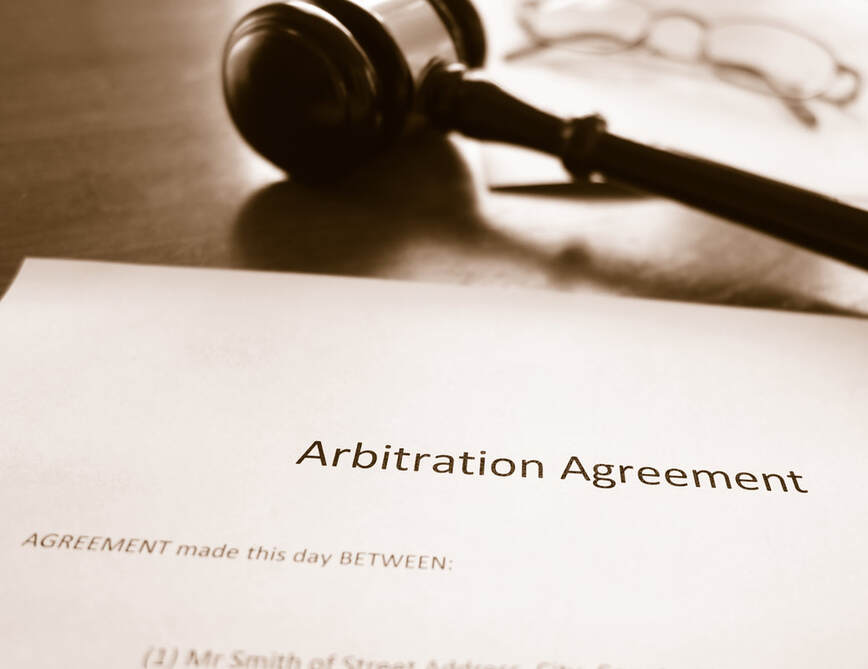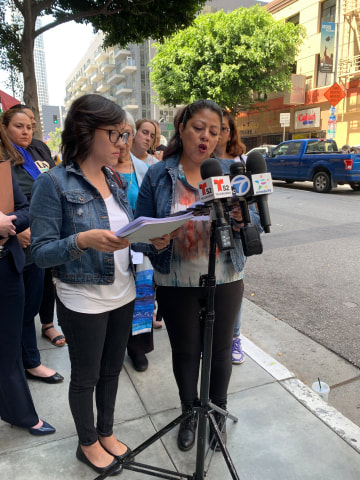 The Guardian published an article last Friday about a pair of high-profile lawsuits alleging that Los Serranos Golf Club repeatedly failed to protect four young women from a sexual harasser who worked as the club’s executive chef for more than two decades. The women are represented by Lauren Teukolsky and Zoe Tucker of UNITE HERE Local 11. The women all began working at Los Serranos in 2021 as line cooks and event servers. They were all between the ages of 17 and 20 at the time. They allege that the Executive Chef, who had worked there for decades, made inappropriate romantic and sexual overtures towards them, frequently commented on their physical appearance, and engaged in inappropriate touching. They allege that the chef would loudly compare their bodies and other physical attributes in crude terms with other male kitchen workers outside of their presence. They allege that after they complained, the chef was only demoted, not fired, and they were required to continue working alongside him. According to the Guardian’s article, sexual harassment is pervasive in the restaurant service and hospitality industries in the US. The article cites a 2021 survey by One Fair Wage that found over 70% of female restaurant employees have been sexually harassed at least once while working in the industry. The lawsuits are especially significant because they target JC Resorts, a luxury resort operator in Southern California that employs Los Serranos’ workers and has spent millions to oppose legislation that would improve protections against sexual harassment for women in the workplace. Ms. Teukolsky previously filed a sex harassment lawsuit against the Terranea, another luxury resort operated by JC Resorts. Ms. Teukolsky’s client, Sandra Pezqueda, was named a TIME “Person of the Year” after she sued JC Resorts based on sexual harassment she suffered while employed at the Terranea. Ms. Teukolsky, has fought to protect employees rights for over 20 years and has represented women in high-profile sexual harassment cases in the past. Most recently, Ms. Teukolsky represented a woman who was sexually harassed while working at Los Angeles’ Chateau Marmont. The lawsuit was covered by the Hollywood Reporter and was one of several lawsuits against the Chateau that prompted a celebrity boycott of the legendary hotel. To read the Guardian’s article in its entirety, click here. If you believe you’ve been sexually harassed at the workplace and want to get in touch with Teukolsky Law, click here.
0 Comments
 On December 7th, President Biden signed the Speak Out Act into law. The law makes nondisclosure agreements (NDAs) unenforceable if signed before a dispute involving sexual assault or sexual harassment arises. It comes less than a year after the passage of the Ending Forced Arbitration of Sexual Assault and Sexual Harassment Act, a law that also improved workplace protections for victims of sexual harassment and assault. The Speak Out Act represents a big victory for #MeToo movement and workers’ advocates. NDAs are frequently used to silence workers and keep accusations of sexual misconduct out of the public eye. They also prevent many workers from explaining job departures and employment gaps caused by sexual misconduct to prospective employers. According to a paper authored by Professors at Syracuse University and the University of Maryland, approximately 26 % of U.S. employees are covered by NDAs. It is important to remember that the bill does not apply to other kinds of workplace disputes such as age or race discrimination. It also does not apply to NDAs signed after a dispute arises. If you have been the target of sexual misconduct in the workplace, click here to get in touch with Teukolsky Law. U.S. Senate passes landmark law to protect victims of sexual assault and harassment from arbitration2/17/2022  Last week, the United States Senate passed the Ending Forced Arbitration of Sexual Assault and Sexual Harassment Act, signaling a huge victory for victims of sexual assault and harassment across the country. The law prevents employers from using forced arbitration clauses to protect themselves from lawsuits alleging sexual assault and harassment. The bill invalidates forced arbitration clauses in “any dispute or claim that arises or accrues” after the date it is signed into law. This appears to mean that it applies to existing agreements that an employee has already signed, but does not revive sexual assault or harassment cases that have already been arbitrated. Employers often include forced arbitration clauses in their employees’ employment contracts to ensure that employees’ claims of sexual assault or harassment are resolved through private arbitration, rather than normal court. Many employers do this because the employees tend to fare worse in private arbitration than they do in court. According to a paper published by the Economic Policy Institute, employees in private arbitration win only about a fifth of the time (21.4 percent), whereas employees in federal court win over one-third (36.4 percent) of the time. Employees also tend to be awarded less in damages in mandatory arbitration than in federal courts. The new bill, H.R. 4445, has not been signed into law yet, but has now been passed by both chambers of Congress with strong bipartisan support. President Biden has indicated support for the bill in the past and is expected to sign it into law soon. If you believe you have faced sexual assault or harassment at work, or have questions about arbitration, contact Teukolsky Law today for a free consultation. LA Country District Attorney George Gascon has issued a statement in support of workers following a suit filed by Teukolsky Law against the legendary Chateau Marmont hotel.
District Attorney Gascón stated: “I am aware of the civil lawsuit and allegations made regarding the Chateau Marmont Hotel. Workers can often feel powerless when dealing with hostile workplaces, dangerous work conditions, and wage theft. I am committed to protecting workers in Los Angeles County.” Gascon’s statement references the lawsuit filed on January 27 by former employee and plaintiff Thomasina Gross. The lawsuit alleges that Ms. Gross, who is African-American, was repeatedly passed over for promotions and work assignments in favor of white candidates and colleagues. The suit also alleges that Ms. Gross faced unwanted touching from guests as she served them, and that management did not help when she attempted to report this conduct. Gascon, who has been in office since December, campaigned on a progressive platform of reforming the DA’s office. His statement follows actress and activist Jane Fonda’s pledge to boycott the Chateau Marmont until it has addressed the workers’ concerns. The Hollywood Reporter wrote an article about Gascon’s statement, which can be found here. If you believe you have experienced racial discrimination or sexual harassment at work, contact Teukolsky Law today for a free consultation. In recent years, California lawmakers have taken on sexual harassment and assault with a series of changes to state law. In the wake of revelations about how institutions and companies keep sexual misconduct and abuse under wraps—from the Catholic Church sex abuse scandal to Harvey Weinstein—the California legislature has largely taken confidentiality agreements surrounding sexual misconduct off the negotiating table. The legal developments aim to shed light on sexual harassment and violence by preserving the ability of victims to speak about their experiences, despite a settlement. Here is what you need to know:
1) California law prohibits confidentiality in settlement agreements in civil cases where the underlying conduct could be criminally charged as a felony sex offense. The prohibition applies not only to cases related to workplace sexual assault, but to all civil cases. Sexual conduct that could prosecuted as a felony includes (among other acts): rape, and sexual assault where the perpetrator used violence, restrained the victim, or fraudulently deceived the victim into believing the touching was for a professional purpose. Where the conduct you allege rises to the level of felony sexual assault, your attorney could be subject to professional discipline by the California State Bar for demanding confidentiality or advising you to agree to confidentiality in a settlement agreement. 2) California law limits provisions in settlement agreements that prevent disclosure of allegations related to sexual harassment, sexual assault, sex-based discrimination, and retaliation. If you have filed a complaint in court or with an administrative agency (such as California's Department of Fair Employment and Housing), the company cannot require you, as a condition of settling your claims, to stay silent about the facts described in your complaint. An exception may be made where the survivor of sexual harassment wishes to maintain the confidentiality of their identity. At the survivor’s request, the settlement agreement can shield the survivor’s identity and facts that could lead to discovery of her identity. It is also permissible for settlement agreements to require the parties’ confidentiality about the dollar figure of the settlement. If you have experienced sexual assault or sexual harassment or sexual assault in the workplace, contact us today for a free consultation.  Teukolsky Law filed a new lawsuit yesterday on on behalf of a female housekeeper at the boutique Freehand Hotel in downtown Los Angeles alleging that she experienced sexual harassment while she cleaned the men’s restrooms located next to the hotel bars. According to the complaint, the hotel's rooftop bar is a “destination for partygoers,” which features loud music and the smell of marijuana smoke. On Friday and Saturday nights, according to the complaint, the bar takes on a “raucous ‘party’ atmosphere” where guests are often visibly intoxicated and stumbling into the bathroom. Plaintiff Edith Gutu is a 44-year old woman who has worked as a housekeeper at the Freehand since March 2018. She frequently cleans the men’s restrooms near the hotel bars on Friday and Saturday nights. She has repeatedly asked management to allow her to close the men’s restroom while she cleans, but they have refused. As a result, Ms. Gutu alleges that she has regularly been exposed to men’s genitals as they use the urinals while she cleans. She also alleges that she feels trapped inside the restroom stall when men enter and start urinating. Ms. Gutu alleges that she has been subject to unwelcome conduct from male guests, including being called a “fucking bitch, fucking Mexican,” or words to that effect, by a male guest she asked to wait outside the restroom until she was done cleaning. Ms. Gutu alleges that she has repeatedly asked Freehand management to let her transfer to the day shift, but they have refused. Even though there are other male staff who could be assigned to clean the men’s restroom, the complaint alleges that Freehand management has not permitted Ms. Gutu to change shifts with them, nor allowed her to close the restroom while she cleans. Instead, after she complained about being exposed to inappropriate guest conduct, management allegedly told her it was “part of [her] job.” Teukolsky Law also represents Leticia Vallejo, a Marriott housekeeper who similarly alleges that she experienced sexual harassment from male guests while she was required to clean the men’s restroom next to a hotel bar. Like the Freehand Hotel, the Marriott allegedly refused to allow Ms. Vallejo to close the men’s restroom while she cleaned. Ms. Vallejo’s lawsuit is pending in Superior Court in Orange County and is in the discovery phase. Under California law, employers have an obligation to protect their employees from sexual harassment by third parties, including customers. If you believe that you have been sexually harassed, contact us today for a free consultation.  Earlier today, Teukolsky Law filed a new sexual harassment lawsuit on behalf of Joey Dalla Betta (pronouns: they/them) against Flaunt Magazine, its CEO Luis Barajas and Editor-in-Chief Matthew Bedard. Barajas founded Los Angeles-based Flaunt in 1998 after a 10-year stint running Detour, a well-known fashion and entertainment magazine. Flaunt covers have featured many high-profile actors and musicians such as Beyoncé, Brad Pitt and Kanye West. Barajas, who is in his mid-50s, hired Dalla Betta as his executive assistant in July 2018. Dalla Betta alleges that Barajas and Bedard ran the magazine based on a culture of fear and intimidation, where advancement was based on a willingness to submit to repeated sexual advances and endure a non-stop barrage of sexual banter. Young aspiring writers like Dalla Betta were scared to complain or quit because jobs in the magazine industry are so rare. (Joey Dalla Betta, pictured left. Photo credit: Lucy-Bleu Knight.) VICE News ran a piece covering the filing of the lawsuit. As described in the piece, "At first, Dalla Betta thought that the expectations and behavior at Flaunt were normal in the journalism industry. They poured themselves into Flaunt, often working through weekends. At times, it felt like even the boundaries between Dalla Betta and the magazine itself had dissolved, because they felt the successes and failures of the magazine so intimately." If you have experienced sexual harassment, contact Teukolsky Law today for a free consultation. The Los Angeles Times has quoted Teukolsky Law founder and owner Lauren Teukolsky discussing the firm's latest sexual harassment lawsuit against Marriott Hotel. The case highlights an employer's duty to protect employees from customers who sexually harass them.
Lauren Teukolsky Quoted iN Bloomberg on Non-Disclosure Agreements in Sexual Harassment Settlements5/14/2018 Bloomberg's Labor and Employment blog quoted Lauren Teukolsky discussing non-disclosure agreements ("NDAs") in sexual harassment settlements. Employees often agree to keep quiet about the settlement terms in exchange for the settlement amount. Sometimes, the employee will even agree not to discuss the underlying facts of the sexual harassment. There is currently a bill pending in the California Legislature that would ban all NDAs in sexual harassment settlements, even if the employee is willing to accept an NDA in exchange for a higher settlement amount. Plaintiff-side employment lawyers are torn about whether a complete ban on NDAs is in their clients' interests. As Ms. Teukolsky stated in Bloomberg: “I think it’s important for my clients to be able to decide whether they’re willing to sign an NDA in exchange for more settlement money." Also - sexual harassment clients themselves sometimes do not want the facts underlying their claims to be publicly discussed, particularly when their cases are settled before a lawsuit has been filed. We will see whether the California Legislature ultimately bans NDAs or not. California law already prohibits NDAs in settlement agreements in civil cases where the underlying conduct could be charged as a felony sex offense.
TIME Magazine has published an article reporting that Teukolsky Law client Sandra Pezqueda, named a TIME "Person of the Year" in 2017, settled her case against Terranea Resort and the staffing agency that placed her there for $250,000. Lauren Teukolsky is quoted extensively in the article. As reported in the article:
“I think one has to assume that the #MeToo movement has altered every employer’s calculations over whether to resolve a case or not,” Teukolsky told TIME. “I think that employers, generally speaking, are going to be much more cautious about going to trial now that women are being believed about their sexual harassment allegations, and every potential juror knows somebody who has had a #MeToo moment.” |
AuthorLauren Teukolsky is the founder and owner of Teukolsky Law, A Professional Corporation. Archives
June 2024
Categories
All
|
Teukolsky Law, A Professional Corporation, represents clients throughout California. Ms. Teukolsky is admitted to practice in the State of California, as well as the United States Supreme Court, Ninth Circuit Court of Appeals, Northern District of California and Central District of California. Disclaimer.
Copyright © 2017
Copyright © 2017

 RSS Feed
RSS Feed